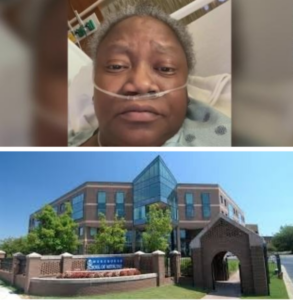A video of Dr. Susan Moore outlining her racist treatment at the hands of battling COVID-19 has gone viral on social media. Moore, a Black woman doctor said she needed to be transferred from the hospital because of poor treatment she attributed to racism. Moore died, prompting an investigation into the IU Health North Hospital in Carmel, Indiana which released a callous statement blaming Dr. Moore for being “intimidating” to the medical staff treating her for Covid-19. Labeling Dr. Moore as “intimidating” and blaming her for her poor treatment is one of the ways in which racism rears its ugly head in hospital rooms across the country. The choice of words by the administrator also demonstrates a profound lack of cultural competency, a blatant disrespect of Dr. Moore’s healthcare credentials and underscores Dr. Moore’s claims that she was being mistreated based on her race. How exactly is a woman who is clearly vulnerable and unable to lift her head from the pillow in the video “intimidating” to fellow medical practitioners treating her?
Well, Morehouse School of Medicine (MSM) and CommonSpirit Health have the answer. Morehouse School of Medicine (MSM), a historically Black medical school and one of America’s leading educators of primary care physicians, and CommonSpirit Health (CommonSpirit), one of America’s largest health systems with locations in 21 states from coast to coast, are responding to the dual pandemic of COVID-19 and racial injustice with a 10-year, $100 million partnership to develop and train more Black physicians, helping address the underlying causes of health disparities and increase access to culturally competent care.
The two leading healthcare organizations are creating a joint undergraduate and graduate medical education program to educate and train the next generation of culturally competent health clinicians and researchers.
“Of the 21,863 students entering medical school in 2019, only 1,626 were Black – and only 619 were Black males,” said Morehouse School of Medicine President and Dean Valerie Montgomery Rice, MD. “This statistic is alarming for many reasons, not the least of which is the impact on patient care. Studies show that Black patients have better outcomes when treated by Black doctors.”
MSM and CommonSpirit are uniquely positioned to impact health equity through education and training opportunities and improved access and care delivery. While there are 155 accredited medical schools in the U.S., MSM and the other three historically Black medical schools produce the majority of the nation’s Black physicians. As one of the largest nonprofit health systems in the nation, CommonSpirit serves some of the most diverse communities in the country and cares for more Medicaid patients than any other health system in the United States.

The partnership will help develop more Black and other minority physicians by ensuring a minimum of 300 additional underrepresented providers complete their residency training annually and support a pipeline of students that will be recruited from communities that have a historical provider shortage. MSM and CommonSpirit will establish five new regional medical school campuses and graduate medical education programs in at least 10 markets in partnership with CommonSpirit healthcare facilities, to be announced in spring 2021.
“We are laying the foundation for patients to have more access to Black clinicians and for Black medical students and graduates to gain community-based experience that they need to be successful in their work,” said CommonSpirit President and CEO Lloyd H. Dean. “Our initiative also will create a pathway for healthcare organizations across the nation to follow and share our learnings, a vital part of our work.”
The collaboration will extend to addressing cultural competency and developing research programs to impact illnesses that disproportionately affect minority and underserved communities. MSM, a recent recipient of a $40 million COVID-19 Resiliency Network grant from the U.S. Department of Health and Human Services, has been at the forefront of biomedical and clinical research initiatives to address diseases that disproportionately affect minority communities.
“We’re immediately leveraging our partnership to address health inequities magnified by the COVID-19 pandemic, as Black Americans are disproportionately impacted by COVID-19,” Dean said. “Together, we will foster a culturally competent system of care that includes testing, care delivery, and vaccine allocation, directed at the most vulnerable populations to reduce the impact of COVID-19 in racial and ethnic communities.”
MSM and CommonSpirit will contribute $21 million in seed money in the first two years, with a goal of spearheading a 10-year, $100 million initiative that invites the support of individual donors, industry partners and philanthropic organizations.
Although Dr. Moore has transitioned, this initiative will help produce more Black doctors who will give Black patients the respect, medical advice and treatment they deserve, and hopefully save lives in the process.
Read more about the initiative at Morehouse School of Medicine.
This post was written and curated by Nsenga K. Burton, Ph.D., founder & editor-in-chief of The Burton Wire. Follow Nsenga on Twitter @Ntellectual.
Follow The Burton Wire on Twitter @TheBurtonWire.









